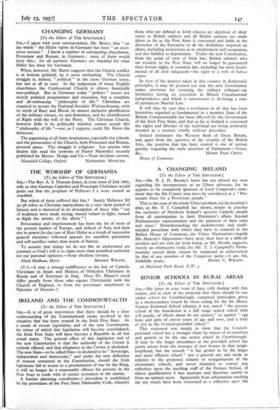IRELAND AND THE COMMONWEALTH [To the Editor of THE SPECTATOR.]
SER,—It is of great importance that there should be a clear understanding of the Constitutional issues involved in the situation that has been created in the Irish Fite State. As a result of recent legislation, and of the new Constitution, by virtue of which this legislation will become' consolidated, the Irish Free State will have become a Republic in all but actual name. The general effect of this legislation and of the new Constitution is that the authority of the Crown is entirely effaced, and that allegiance to the Crown is abolished: The new State—to be called Eire—is declared to be " Sovereign; independent and democratic," and under the new definition of treason contained in the Constitution, should the Irish legislature fail to assent to a proclaniation of war by the King, it will no longer- be a treasonable offence for persons in the Free State to trade with or render assistance to the enemy.
A further alarming constitution _1 precedent is established by the-provisions of the Free State Nationality Code, whereby those who are defined as Irish citizens arc deprived of their status as British subjects and all British subjects are made aliens so far as the Free State is concerned and liable at the discretion of the Executive to all the disabilities imposed on aliens, including restrictions as to employment and occupation, and also liability to deportation. Under the new Constitution, from the point of view of Irish law, British subjects who are resident in the Free State will no longer be guaranteed their former rights at common law, including the most funda- mental of all civil safeguards—the right to a writ of habeas corpus.
In view of the interest taken in this country in democratic principles, it may be pointed out that the new Constitution ' makes provision for retaining the military tribunal—an institution having no precedent in British Constitutional jurisprudence, and which is tantamount to declaring a state of permanent Martial Law.
It will thus be seen that a revolution in all that has been heretofore regarded as fundamental in a member State of the British Commonwealth has been effected by the Government of the Irish Free State, and that as far as Ireland is concerned the rights and liberties of the individual are being arbitrarily invaded in a manner wholly without precedent.
Ireland dominates the Western flank of Great Britain, and, apart from the question of the security of the British Isles, the position that has been created is one of serious • . gravity, requiring the early attention of Parliament.—Yours, House of Commons.






























































 Previous page
Previous page